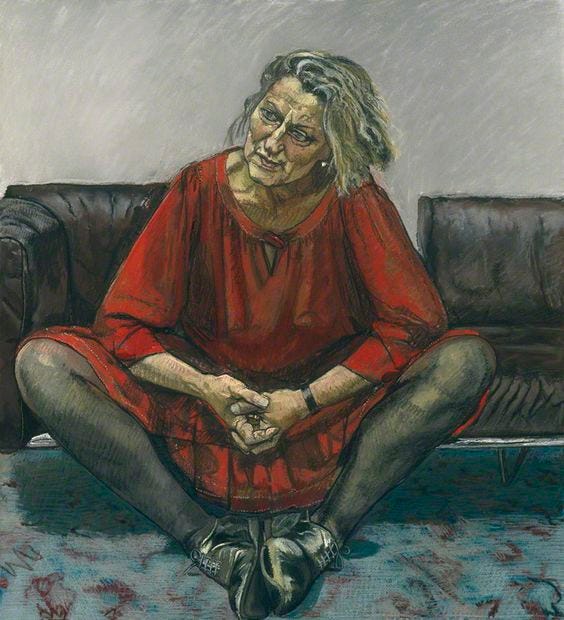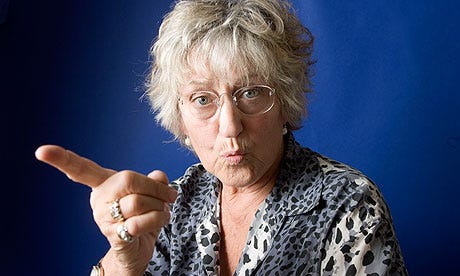When I was asked to chair an Oxford Union debate on Can Women Have it All?, I knew it would be a lively discussion, but I didn’t expect to leave with life-altering advice from one of the most controversial feminists of our time.
Germaine Greer, firmly on the No side, and Baroness Helena Morrissey, fighting for the Yes. My role? The Chairman.
The one tasked with holding this titanic debate in check. I knew it wouldn’t be easy, but I hadn’t quite anticipated how much I’d be wrestling with ~ testicles, of all things.
Yes, testicles.
Greer, ever the maverick, refused to stick to the question at hand. Instead, she took us on a wild, circular journey, stopping at the peculiar crossroads of male anatomy. Of course, she argued, women can’t expect to have it all. Not a shred of it.
And why? Well, because we lack the prerequisite for success: testicles.
You either choose a career or children, she declared. To attempt both? Madness.
Greer lingered over the role of testicles with a fascination that grew uncomfortable, and yet, the audience—500 strong—hung on her every word. She had them, captive in her grip, as she scanned the room, dragging them into this strange, phallic terrain.
It was as if we’d veered off the road of work-life balance and were now careening toward something far more Freudian. We all knew she had a glint in her eye, the sort that carries with it a promise of something outrageous. We knew she was leading us somewhere dangerous.
And then, just like that, she dribbled to a close. No crescendo, just a faint tapering off, leaving the sour aftertaste of her repetitive insistence on male genitalia as the key to human success.
I stared at the audience, mouths agape, not yet over her testicle-fixated rant.
Now it was my turn. My moment to pull this weird set of arguments together, to make sense of the nonsensical.
I rose to my feet, and in that instant, I recalled the words of an old professor who once told me, “Danusia, when you’re out of smart arse words, fall back on truth.”
And the truth was staring me in the face. I glanced at the audience, their lip-licking anticipation almost palpable. They were waiting for me to synthesise the absurd merry-go-round Greer had just taken us on.
I stood, legs wide apart, exactly as I’d been taught when you need to command authority. I hadn't taken notes. How could I? Greer had pulled the rug out from under us all.
I was meant to summarise, to extract the salient points. But what salient points could I possibly pull from a speech revolving around the word "testicles"?
“Thank you, Germaine,” I began, turning to face her, feeling the room tighten. “I’m grateful you centred testicles.” I paused, scanning the crowd and then back at Greer. “Because what you just said was, quite frankly, utter balls.”
The eruption from the audience was immediate—a chaotic blend of gasps, laughter, disbelief. A sound that bounced off the old walls of the hallowed Oxford Union debating hall. They weren’t just laughing, they were shocked.
And then I heard the loudest laughter of all. It was Greer herself, doubled over, howling with delight.
The crowd settled, and I sifted through the core of her argument. Yes, she had thrown metaphors about male anatomy like confetti, but beneath it, I found the points worth lifting. I did her proud, scooping up her critique and presenting it back to the audience.
<Sidebar> ——> Later, over the post debate OU dinner, I found myself opposite a broadsheet editor. Married. Bored. He slid a hotel room number (scrawled on a slip of paper) across the table with the casual arrogance of a man who’s forgotten the world is watching. “Be there,” he said. Reader, I left him waiting at The Randolph, in room 149.
The real moment of the evening came just after the debate.
Germaine Greer pulled me aside, away from the others. I had no idea what she wanted. I’d called her out, after all, and who takes on Germaine Greer lightly? But her eyes were lit with something else, something unexpected.
“Few people take me on, Danusia,” she said, her voice low. “And most of those who do end up annoying me. But you? That was brilliant. You got up there, and you took me on. Keep doing that. Everywhere you go. Promise me.”
And in that moment, she went onto share something more with me—an intimate truth about her life and motherhood that I hadn’t expected. She quietly told me that she’d hoped to be a mother but had suffered a miscarriage late in life. It was a deep grief she still carried.I felt the weight of her words settle between us. It brought us together, this shared vulnerability.
Our conversation was worth the bowel-curdling fear of the past few hours. I had been out of my depth, and yet here she was, telling me to swim deeper. Not just to swim, but to dive headlong into unknown waters. She urged me to keep standing up, to keep voicing truth, to challenge what needs to be challenged.
And to call out balls when I see them.
I’ll leave you with two questions:
1. Have you ever received encouragement or support from an unexpected or unlikely source? What did that mean to you?
2. How have moments of vulnerability—yours or someone else's—changed the way you think about confrontation or debate?
I hope there’s something here for you. Meet me in the comments? It makes my day to hear from you!
Till next time,
Danusia x









Danusia, I love this. You did an artful job of telling this story. Kudos to you for tackling the difficult and making it all look so easy.
Balls! How amazing to have the gift of speaking both truth and humor in front of a crowd! What an inspiring story. Have you found yourself swimming in the deep since then?
I’ve never encountered this kind of opportunity- LOVE learning about it from you! 🥳